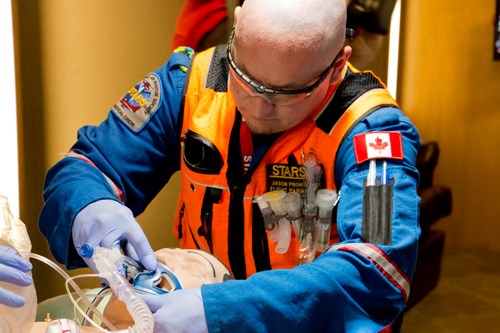STARS Regina unveiled a Mobile Education Unit (MEU), on Thursday, May 1, which will assist rural communities in gaining access to continuing education.
STARS first started the MEU program in Alberta in 1999 and although there are simulation programs already located in Saskatchewan, but none are mobile.
A mobile unit will allow STARS to both keep responders in rural areas trained in numerous scenarios, while also providing a medium for the STARS team to meet and work with rural practitioners thus opening up relationships for the day the STARS helicopter is needed in an area.
The motorhome contains equipment which allows Stan, a lifelike mannequin, to breath, bleed, and talk to their healthcare providers as the training commences. All responses from Stan are accurate simulations of how a patient may react to CPR, intravenous, and intubation.
For example, on May 1, simulations were done for those in attendance to watch. Stan was having difficulty breathing and the STARS flight crew quickly found he was suffering of acute respiratory failure.
The control room complete with monitors allows the trained STARS staff to watch those working on Stan closely, while also displaying Stan's vital signs.
Though equipped on the bus, Stan can also be used in hospital emergency rooms, class rooms, and even mock accident scenarios though the MEU has been booked from now until the end of October.
The program is free to emergency rural responders and allows for people to take in educational scenarios without having to travel to the city.
"In essence we're bridging the gap of geography," Kish Lyster, Dr. Kish Lyster, STARS Transport Physician, Hospitalist RQHR, and Medical Director of Dilawri Simulation Centre, explained. "Saskatchewan is a large place and staff won't have to drive and remove themselves from work for the opportunity to train. Equally important is that it allows people to train in teams. Nurses, physicians, and other healthcare professionals all work in teams, but we rarely train in teams."
"The program can run lifelike scenarios of critically ill patients ranging from coronary artery disease to respiratory failure to circulatory collapse to trauma."
Though Saskatchewan's MEU was unveiled on May 1, it has already been well received in seven different communities. In high demand they are now booked until October, but are interested in contacting local responders to see if they would be interested in the MEU coming to southeast Saskatchewan.
In addition to the simulations that can be completed with Stan there are also pediatric and youth mannequins for individuals to train their skills on as well.
"I'm proud to be a part of the STARS simulation process, it's really been exceptional to watch our teams acquire and perfect the skills they require in their day to day work," Lyster said.
"Simulation is essential in it allows healthcare teams to practice high acuity, high risk situations in a safe environment. It's been proven to improve outcomes, patient safety, and staff morale."
Not only was STARS celebrating the first Mobile Education Unit in Saskatchewan, they were proud to announce their second anniversary for having STARS in the province.
In 2013 STARS responded to 133 road vehicle collisions, 96 falls, 75 incidents related to sports and recreation, 73 all-terrain vehicles, 59 motorcycles, 58 workplace related incidents, 39 animal related calls, 35 pedestrians being struck by vehicles, 25 snowmobile incidents, and 18 household calls regarding lawn mowers, electrical shocks, etc...
Of these calls Arcola required STARS seven times, Carlyle needed STARS five occasions, Kenosee Lake once, Kisbey twice, Lampman twice, Stoughton required STARS three times, and Wawota once. STARS was therefore active in the immediate area 21 different times, while 800 calls came from numerous other communities across Saskatchewan through both the Saskatoon and Regina bases.




